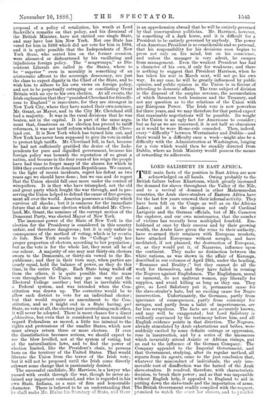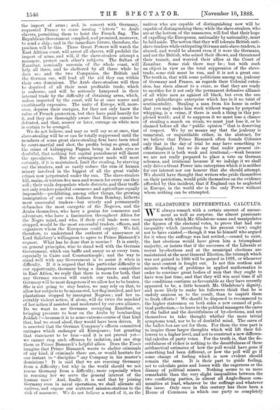LORD SALISBURY IN EAST AFRICA.
THE main facts of the position in East Africa are now acknowledged on all hands. Owing probably to the British failure before Khartoum, which greatly increased the demand for slaves throughout the Valley of the Nile, and to a revival of demand in other Mahommedan countries, the Arab slave-stealers of Eastern Africa have for the last few years renewed their infernal activity. They have been felt on the Congo as well as on the African Lakes ; and it is the opinion not only of Cardinal Lavigerie and the German officials, but of Mr. Cameron the explorer, and our own missionaries, that the number of victims has recently been multiplied fourfold. Em- boldened at once by their success and by their growing wealth, the Arabs have given the reins to their audacity, have re-armed their retainers with European muskets, have attacked Europeans without scruple, and have meditated, if not planned, the destruction of European, or, as they would put it, of Nazarene, influence upon the continent. They make no distinction between the white nations, as was shown in the affair of Karonga, described in our columns of April 28th, under the heading, "Romance and Reality ;" but they cannot do all the work for themselves, and they have failed in rousing the Negroes against Englishmen. The Englishmen, moral or immoral, do not maltreat women, pay liberally for supplies, and avoid killing as long as they can. They give, as Lord Salisbury put it, permanent cause for the slave-stealer's hate, but no exciting cause for Negro insurrection. Unfortunately, the Germans, partly from ignorance of consequences, partly from contempt for savages, and partly from a habit of imperiousness, are far less scrupulous. The facts are not accurately known, and may well be exaggerated ; but Lord Salisbury is evidently convinced by the testimony before him, and all English evidence points in that direction. The Negroes,, already stimulated by Arab exhortations and bribes, were suddenly excited by some definite outrage or oppression, rose in insurrection, and by a series of the massacres which invariably attend Asiatic or African risings, put an end to the influence of the German Company. The Company appealed to the Imperial Government, and that Government, studying, after its regular method, all reports from its agents, came to the just conclusion that, whatever the misconduct of individuals, the only irre- movable root of disaffection was the hatred of the Arab slave-stealers. It resolved, therefore, with characteristic decision, to break their power ; and as that was impossible without English help, it appealed to England to aid in putting down the slave-trade and the importation of arms. The British Government readily complied with the request, promised to watch the ceast for slavers, and to rrehibit the import of arms ; and, in concert with Germany, requested France to cease issuing " letters " to Arab slavers, permitting them to hoist the French flag. The Republican Government complied, and promised, moreover, to send a ship ; and in the immediate future, therefore, the position will be this. Three Great Powers will watch the East African coast, will arrest all slavers, will prohibit the import of arms, and will, if the slave-stealers attempt a massacre, protect each other's subjects. The Sultan of Zanzibar, nominally suzerain of the whole coast, will help all three, and be sheltered by all three while he does so ; and the two Companies, the British and the German one, will lend all the aid they can within their own dominions. The Arab slave-stealers will thus be deprived of all their most profitable trade, which is seaborne, and will be seriously hampered in their internal trade by the difficulty of obtaining arms, which, unless imported by the coast, will be at once scarce and exorbitantly expensive. The unity of Europe, will, more- over, depress their energies, for they not only know the value of French protection, but they have paid heavily for it, and they are thoroughly aware that Europe cannot be defeated, and that, sooner or later, outrage on white men is certain to be avenged.
We do not believe, and may as well say so at once, that slave-stealing will be or can be totally suppressed until the members of some great slave-stealing firm have been tried by court-martial and shot, the profits being so great, and the crime of kidnapping Pagans being in Arab eyes so doubtful, that nothing but capital punishment will daunt the speculators. But the arrangement made will most certainly, if it is maintained, limit the stealing, by starving out the stealers, and so vastly reduce the sum of human misery involved in the biggest of all the great visible crimes now perpetrated under the sun. The slave-stealers kill, maim, or torture five men and women for every one they sell ; their raids depopulate whole districts, and their traffic not only renders peaceful commerce and agriculture equally impossible—prohibiting, among other things, the growing immigration of our own Indians from Bombay, hitherto most successful traders—but utterly and permanently debauches the most energetic of the Negroes, and the Arabs themselves, who have a genius for commerce and adventure, who have a fascination throughout Africa for the Negro mind, and who, if their evil trade were once stopped, would be the most successful traders, officers, and organisers whom the Europeans could employ. We fail, therefore, to understand the outburst of annoyance at Lord Salisbury's willingness to agree to Prince Bismarck's request. What has he done that is unwise ? It is surely, on general principles, wise to stand well with the German Government, which can baffle and annoy us at every turn, especially in Cairo and Constantinople ; and the way to stand well with any Government is to assist it when in difficulty. If it is argued that this particular difficulty is our opportunity, Germany being a dangerous competitor in East Africa, we reply that there is room for both, that any German success will enrich our trade, and that Germany will be most dangerous if we allow her to be beaten. She is not going to stay beaten, we may rely on that, to allow her subjects to be massacred, her flag insulted, and her plantations stopped by insurgent Negroes ; and her in- evitably violent action, if alone, will do twice the mischief of her action if assisted and moderated by our own alliance. Do we want to see Germans occupying Zanzibar, or bringing pressure to bear on the Arabs by bombarding Jeddah ?—because it is to some extreme course of that kind that, had we stood aloof, they would have been driven. It is asserted that the German Company's officers committed outrages which endanger all Europeans ; but granting that statement to be true—and it is not proved yet— we cannot stop such offences by isolation, and can stop them as Prince Bismarck's helpful allies. Does the Times Imagine that Prince Bismarck wants to shelter criminals of any kind, if criminals there are, or would hesitate for one instant to " discipline " any Company in his master's dominions ? It is said that we are rescuing Germany from a difficulty ; but why in the world should we not rescue Germany from a difficulty, more especially when in rescuing her we serve the general interest of the human race ? And, finally, it is said that by joining Germany even in naval operations, we shall alienate all natives, and expose our scattered mission-stations to the risk of massacre. We do not believe a word of it, as the natives who are capable of distinguishing now will be capable of distinguishing then; while the slave-stealers, who are at the bottom of the massacres, will feel that their hope of expelling the Europeans, nationality by nationality, must be laid aside. The notion that they will tolerate British anti- slave-traders while extirpating German anti-slave-traders, is absurd, and would be absurd even if it were the Germans, and not the British, who seized their dhows, and threatened their transit, and worried their allies at the Court of Zanzibar. Some risk there may be ; but with such an object in view as the total suppression of the slave- trade, some risk must be run, and it is not a great one. The truth is, that with some politicians among us, jealousy of Germany and France, as regards their Colonial exten- sion, has risen almost to a craze, so that they are ready to sacrifice for it not only the permanent defensive alliance of all white men as against all black, but even the one great philanthropic enterprise which has in it no taint of sentimentality. Stealing a, man from his home in order that you may make him work without wages by perpetual whipping, is a crime, if there is such a thing in this per- plexed world ; and if to suppress it we must lose a chance of stealing a march on rivals, we must just lose it, or be shamed before all the "public opinion" that is deserving of respect. We by no means say that the jealousy is unnatural, or unjustifiable either, in the abstract, for we believe that Prince Bismarck often founds Colonies only that in the day of trial he may have something to offer England ; but we do say that under present cir- cumstances it is both weak and irrational,—weak because we are not really prepared to place a veto on German schemes, and irrational because if we indulge it we shall only drive a Great Power into enterprises which it is neither for our interest nor our honour that she should attempt. We should have thought that writers who pride themselves on their patriotism, would wide themselves on the evidence afforded by this incident, that if England can be neglected in Europe, in the world she is the only Power without whom nothing can be attempted.







































 Previous page
Previous page